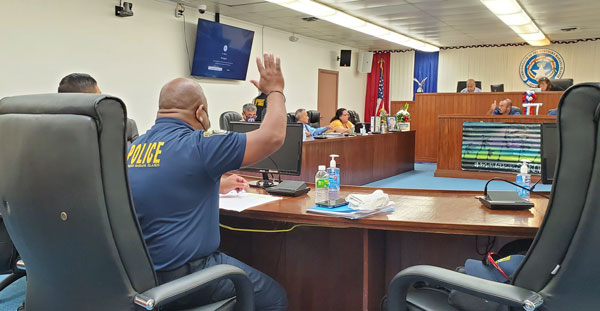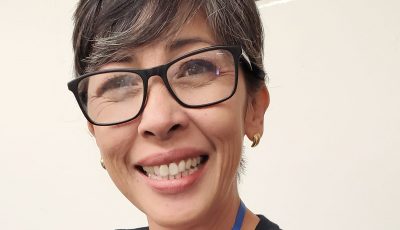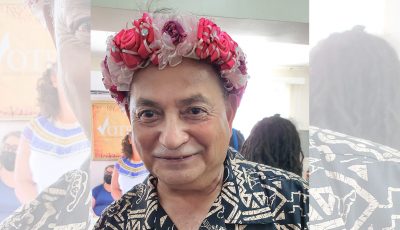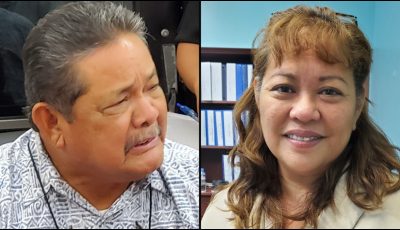Heated arguments beset JGO hearing; Kaipat ends testimony
Police Lt. Henry Emery Kaipat of Boating Safety finally completed his testimony last Friday afternoon before the House of Representatives Judiciary and Governmental Operations Committee, but not before the committee hearing got bogged down by arguments over his constitutional right to speak in Carolinian and his insistence on speaking on the record about his opinion of the proceedings.

Police Lt. Henry Emery Kaipat raises his hand to be allowed to read his statement Friday before the House of Representatives Judiciary and Governmental Operations Committee chaired by Rep. Celina R. Babauta (D-Saipan). The JGO is investigating Gov. Ralph DLG Torres’ expenditures of public funds and travels. (Ferdie De La Torre)
In the continuation of the JGO investigation into Gov. Ralph DLG Torres’ expenditures and travels, Kaipat’s testimony was held up several times by heated debates between his lawyer, Anthony Aguon, and some committee members, much like what happened at the start of Kaipat’s testimony last Wednesday. See video here.
That prompted JGO chair Rep. Celina R. Babauta (D-Saipan) last Friday to preface the hearing by warning that “the animated contest” of last Wednesday’s hearing will not be tolerated and that any excessive and unnecessary outbursts and speaking over the members of this committee will not be condoned. At one point, Babauta warned Aguon: “I must remind you, counsel, that your witness is the recipient of the subpoena by this committee and you may not speak or testify for him.”
The House’s official translator, Jesus Elameto, made a statement in Carolinian addressed to Kaipat. House counsel Joseph Taijeron then handed to the media a copy of Elameto’s statement written in English. In the statement, Elameto told Kaipat that in his letter written in plain English, he asked to testify in Carolinian and that the JGO Committee granted that request.
Elameto said Babauta had told Kaipat and his counsel that he may speak in Carolinian, Chamorro, or English. He said how Kaipat responds to the questions is entirely up to him.
Elameto said the committee noted that when Kaipat was sworn in, the oath was in English and he responded in Carolinian without any problems.
The translator said they will ask questions in English, and if Kaipat understands the questions, there is no need to translate anything that he already understands.
Elameto said Kaipat may utilize his interpreter if he prefers. He said Kaipat may respond to the question in Carolinian or any language that he prefers.
Later in the proceedings, Kaipat clarified that he never stated that he was unable to understand English as he can speak English and Chamorro as well. He, however, pointed out that he understands best in Carolinian.
Kaipat said this is not an issue of his proficiency in English and that this is not an attempt to delay his testimony. “This is about making sure that I understand your questions fully and clearly, so that I may provide the best response,” said Kaipat, adding that, most importantly, this is about promoting and preserving the islands’ culture.
As the committee was about to start asking Kaipat about some travel-related documents, Kaipat insisted on being allowed to say something about the proceeding. That prompted Babauta to order a short recess, during which Aguon said it sounds like the committee is preventing his client from speaking.
The lawyer then gave the media a copy of Kaipat’s statement written in English and Carolinian. In it, Kaipat said he understands the importance of testifying before the committee. “That is why I have requested to testify in Carolinian, which is a right provided to me by the CNMI Constitution,” he said, adding that the inclusion of Chamorro and Carolinian as the official languages of the Commonwealth in the Constitution is a recognition of the culture and traditions of the people.
Kaipat said the government should encourage the usage and preservation of the CNMI’s native languages. Instead, he said, the JGO’s decision to deny his simple and reasonable request to have its questions translated into Carolinian has turned his testimony into a big spectacle.
Kaipat said the CNMI Supreme Court’s opinion also protects his rights.
He said JGO questioned the content of his notice to speak in Carolinian, but has laid no rules or procedures on how to go about making such a request or how any of those requests are processed. The lieutenant said the committee also doesn’t have any procedures for how translations are made at hearings.
He said when a prior witness provided the same notice to testify in Chamorro, a translator sat next to Babauta and statements by both the committee and the witness were translated right after they were spoken.
Kaipat said at the next hearing for the same witness, the JGO decided to limit translations only to questions directed at the witness.
Now, he said, the JGO insists that it will only provide translations when he asks for them. “Yet when I did request on record for each of the committee’s questions to be translated after it was asked, the committee still refused to do so,” Kaipat said.
He said this is his request and that he’s here in compliance with the subpoena and stand ready to answer any questions.
However, the lieutenant said, he’s invoking his right to speak Carolinian and to have the questions asked him to be in Carolinian.
When the hearing resumed, Babauta proceeded to read his prepared statement. That porompted Babauta to ask Aguon what’s going on and what he advised his client. Aguon said his client is speaking and that it is not a response to Elameto’s statement, but a statement regarding what’s going on and also making a request.
Rep. Christina E. Sablan (D-Saipan) then reiterated the rules that Babauta had spelled out at the start of the hearing, saying that if Kaipat witness wishes to submit a statement in writing, he may do so but they need to get on with the proceeding.
Rep. Edwin K. Propst (D-Saipan) described the situation as “insane,” saying that Aguon had made certain accusations that were disrespectful to Babauta and the committee and cannot be tolerated.
“I don’t think any judge would tolerate this type of behavior. And certainly our rules are clear, who’s in charge right now is the chair!” Propst said.
Aguon said the committee’s rules don’t trump the constitutional rights of his client. “Nobody’s trumps the constitutional rights. And that’s all I’m trying to preserve. You guys are trying to make this like personal attack?” Aguon asked.
Sablan said this is not the time to debate with the counsel of the witness. “I have zero interest in debating with the counsel for our witness today and really we do have to get through this proceeding. Counsel should not be allowed to disrupt or interrupt or unduly delay this lawful investigation. So let’s hear from Lt. Kaipat. Let’s stop hearing from the counsel and let’s move on,” Sablan said.
The JGO later presented exhibits and Kaipat started his testimony in Carolinian.



























